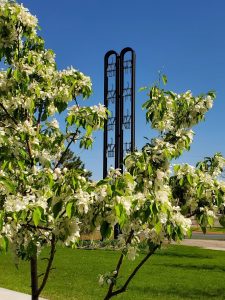Learning From Ants – A Weekly Letter From Rabbi Davis – May 10, 2019
Shalom Chaverim
In these days between Passover and Shavuot, between Egypt and Sinai, it is traditional to study musar. These are Jewish teachings that help refine our character making us worthy of receiving Torah. An intriguing teaching of this nature offers us a message about the critical issue of our day.
We read in the Talmud, “Rabbi Yochanan taught, had the Torah not been given, we could have learned modesty from the cat. We could have learned honesty from the ant. We could have learned fidelity from the dove and derekh eretz, proper manners, from the rooster” (Eruvin 100b).
Commentaries explain each case. For example, the ant would never steal grain from another ant teaching us honesty; the dove is faithful to his partner teaching us fidelity, and so on.
There is much to say about this passage. First, it seems to imply that at its essence, the Torah is about refining our middot, our character traits. It teaches us how to live up to our best selves. At the same time, it could imply that the Torah is superfluous. After all, we could learn everything from nature. Why then do we need the Torah? Is it because we are alienated from the world of nature? Or, is it because the Torah teaches us in a way that suits our learning style? I am not sure.
What I do know is that I love the idea that when we pay attention, when we connect deeply with the world around us, we find it has much to teach us. And that is why I bring it to mind today. Recently, we heard about a new report presented to the UN about the quickly deteriorating state of our environment. Millions of species are disappearing at an alarming rate that threatens our lives and the life of the planet.
 Consider this passage in that light. At first glance, this teaching could be criticized. It presumes that humans are the pinnacle of creation and nature exists basically to serve our needs. That perspective is highly problematic. It is the very reason we are facing ecological disaster- because it is all about me. But implicit in Rabbi Yochanan’s teaching is an antidote to that hubris, a humbling message about the nature of humans. As sophisticated as we might consider ourselves, we have something to learn from the lowly ant!
Consider this passage in that light. At first glance, this teaching could be criticized. It presumes that humans are the pinnacle of creation and nature exists basically to serve our needs. That perspective is highly problematic. It is the very reason we are facing ecological disaster- because it is all about me. But implicit in Rabbi Yochanan’s teaching is an antidote to that hubris, a humbling message about the nature of humans. As sophisticated as we might consider ourselves, we have something to learn from the lowly ant!
In his book, The Way into Judaism and the Environment, Jeremy Benstein explains, “acknowledgment of the morally exemplary character of elements in nature and their spiritual merit and import, can break down the strict dichotomy many of us hold between our responsibilities to humans and to the nonhuman world.”
In other words, rather than thinking of humans as separate from the rest of the environment, we should see our lives and our fate as bound together. Only by cultivating the humility, by developing the capacity to learn from nature, can we hope to live in harmony with the world.
Bivrakha,
Rabbi Alexander Davis
adavis@bethelsynagogue.org
אמר רבי יוחנן אילמלא לא ניתנה תורה היינו למידין צניעות מחתול וגזל מנמלה ועריות מיונה דרך ארץ מתרנגול
